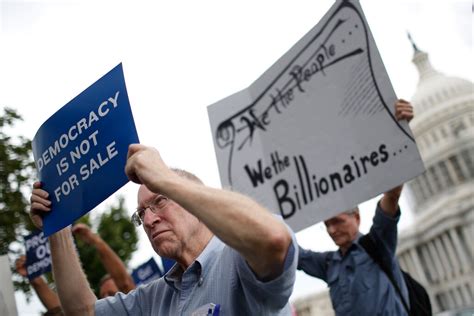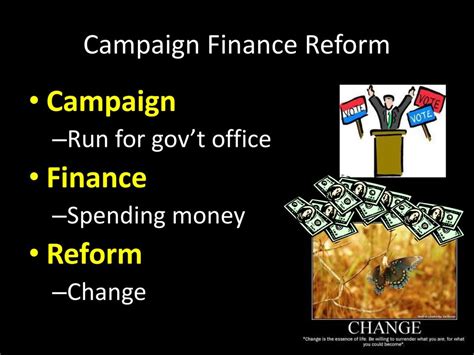What Is Campaign Finance Reform

Campaign finance reform is a critical aspect of the democratic process, aiming to regulate the influence of money in politics and ensure fair and transparent elections. With the increasing role of money in political campaigns, these reforms have become a crucial topic of discussion and debate, especially in the United States. In this article, we delve into the world of campaign finance reform, exploring its history, key principles, and the impact it has on the electoral landscape.
Understanding Campaign Finance Reform

Campaign finance reform refers to the set of laws, regulations, and ethical guidelines implemented to govern the funding of political campaigns. The primary objective is to mitigate the potential corruption and undue influence that large contributions can have on the political process. By establishing rules and limits on campaign contributions, these reforms aim to promote transparency, fairness, and equality of opportunity for candidates and voters alike.
The need for campaign finance reform arises from the fundamental principle of democracy: that government should be accountable to the people, not to special interests or wealthy individuals. When money becomes a dominant factor in campaigns, it can skew the political agenda, favoring those with the deepest pockets and undermining the voice of the average citizen. Thus, campaign finance reform strives to strike a balance, ensuring that elections are influenced by the will of the people rather than the size of their wallets.
The Evolution of Campaign Finance Reform

The history of campaign finance reform in the United States dates back to the early 20th century when concerns about the impact of corporate spending on elections first arose. The first significant reform effort was the passage of the Tillman Act in 1907, which prohibited corporations from making direct contributions to federal candidates. However, this law had limited impact as it was often circumvented, and enforcement was challenging.
In the 1970s, a series of scandals, including the Watergate scandal, brought campaign finance into the national spotlight. The resulting outcry led to the enactment of the Federal Election Campaign Act (FECA) in 1971 and its subsequent amendments in 1974. FECA introduced important reforms, such as requiring disclosure of campaign contributions and expenditures, setting contribution limits, and creating the Federal Election Commission (FEC) to enforce these regulations.
Despite these initial steps, campaign finance remained a contentious issue, and further reforms were introduced. The Bipartisan Campaign Reform Act (BCRA), commonly known as the McCain-Feingold Act, was enacted in 2002. This legislation imposed stricter limits on soft money contributions (unregulated donations to political parties) and banned national political party committees from accepting or spending soft money. The BCRA also banned corporate and union-funded issue ads that mentioned specific candidates within 60 days of a general election or 30 days of a primary.
Key Principles of Campaign Finance Reform
Disclosure and Transparency
One of the cornerstone principles of campaign finance reform is the requirement for disclosure and transparency. This principle ensures that the public has access to information about the sources and amounts of campaign contributions. By disclosing this data, voters can make more informed decisions and hold candidates and donors accountable.
Disclosure requirements vary across jurisdictions but often include details such as the name and address of the contributor, the date and amount of the contribution, and whether it was made by an individual, corporation, or political action committee (PAC). Some jurisdictions also mandate the disclosure of the occupation and employer of individual contributors.
Contribution Limits
Contribution limits are another vital aspect of campaign finance reform. These limits restrict the amount of money an individual or entity can donate to a political candidate or committee. The idea is to prevent a single donor from having excessive influence over a campaign and to promote a more equitable distribution of resources.
The specific limits vary depending on the jurisdiction and the type of election. For instance, federal elections in the United States have different contribution limits for individuals, PACs, and political parties. Additionally, some states and localities have their own contribution limits, often more stringent than federal regulations.
Public Funding and Matching Funds
Public funding of campaigns is a concept designed to reduce the reliance of candidates on private donations. It involves the use of taxpayer dollars to finance political campaigns, ensuring that candidates can run for office without being beholden to wealthy donors.
In the United States, the Presidential Election Campaign Fund provides public funding for presidential candidates who meet certain criteria, such as raising a minimum amount of money from a specified number of small donors. This system aims to level the playing field and encourage a broader base of support for candidates.
Independent Expenditures and Super PACs
Independent expenditures and Super PACs (Political Action Committees) have become significant players in the campaign finance landscape. These entities can raise and spend unlimited amounts of money to support or oppose political candidates, provided they operate independently of the candidates’ campaigns.
While independent expenditures and Super PACs offer a way for citizens to participate in the political process, they have also raised concerns about their potential to influence elections disproportionately. As a result, there have been ongoing debates and legal challenges surrounding the regulation of these entities.
The Impact of Campaign Finance Reform
Enhancing Transparency and Accountability
One of the most notable impacts of campaign finance reform is the increased transparency it brings to the political process. By requiring disclosure of campaign finances, voters can better understand the sources of funding behind political campaigns. This transparency allows for greater scrutiny of candidates and their potential biases or obligations to specific interest groups.
Furthermore, disclosure requirements can help deter illegal or unethical practices, as the fear of public exposure serves as a deterrent. It also empowers voters to make more informed choices, as they can research and evaluate candidates based on the financial support they receive.
Promoting Fairness and Equal Opportunity
Campaign finance reform aims to create a more level playing field for candidates, ensuring that elections are not dominated by those with the most financial resources. By imposing contribution limits and promoting public funding, these reforms strive to give candidates from diverse backgrounds a chance to compete effectively.
Equal opportunity in elections is crucial for a healthy democracy. It allows for a wider range of viewpoints to be represented and encourages candidates to focus on policy proposals that resonate with a broader audience rather than catering solely to wealthy donors.
Addressing the Influence of Money in Politics
The primary goal of campaign finance reform is to mitigate the influence of money in politics. While it is impossible to eliminate money from the political process entirely, these reforms aim to strike a balance that minimizes the potential for corruption and undue influence.
By setting contribution limits and enforcing disclosure requirements, campaign finance reform seeks to prevent a small group of wealthy individuals or corporations from having an outsized impact on elections. It also discourages candidates from tailoring their policies to align with the interests of major donors, fostering a more responsive and representative government.
Challenges and Future Prospects
Despite the progress made through campaign finance reform, challenges remain. The ever-evolving nature of campaign financing strategies and the increasing role of technology in fundraising and advertising present new obstacles to effective regulation.
Additionally, the Supreme Court's decision in the Citizens United v. FEC case in 2010, which lifted restrictions on corporate and union spending on independent political advertisements, has had a significant impact on campaign finance. This decision has led to a surge in spending by Super PACs and other outside groups, further complicating the regulatory landscape.
Looking ahead, campaign finance reform will continue to be a critical area of focus for those dedicated to preserving the integrity of the democratic process. As technology advances and new methods of political engagement emerge, ongoing efforts to adapt and strengthen campaign finance regulations will be essential.
Conclusion

Campaign finance reform is a complex and ever-evolving field, but its importance in preserving the integrity of democracy cannot be overstated. By understanding the principles, history, and impact of these reforms, we can better appreciate the challenges and opportunities that lie ahead. As citizens, it is our collective responsibility to ensure that the democratic process remains fair, transparent, and responsive to the will of the people.
What are some of the key challenges in implementing effective campaign finance reform?
+Implementing effective campaign finance reform faces several challenges. These include the dynamic nature of campaign financing strategies, the influence of special interest groups, and the ongoing debate over the appropriate balance between free speech and campaign finance regulation. Additionally, the complexity of the legal and regulatory framework can make it difficult to enforce and update regulations effectively.
How has technology impacted campaign finance and its reform efforts?
+Technology has had a significant impact on campaign finance. It has revolutionized fundraising methods, allowing candidates to reach a broader audience and raise funds more efficiently. However, it has also introduced new challenges, such as the use of targeted online advertising and the potential for foreign interference in campaigns through social media and other digital platforms.
What are some of the potential consequences of inadequate campaign finance reform?
+Inadequate campaign finance reform can have serious consequences for democracy. It can lead to a further concentration of political power in the hands of a few wealthy individuals or corporations, undermine the voice of average citizens, and create a system where policy decisions are influenced more by financial interests than by the public good.



